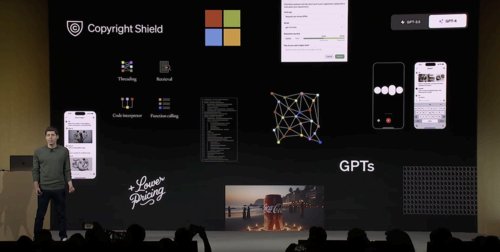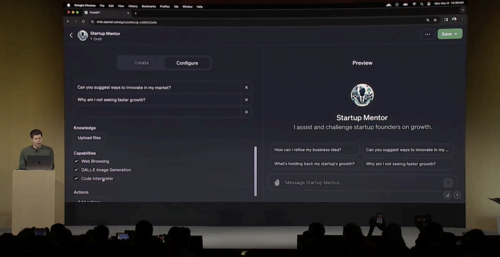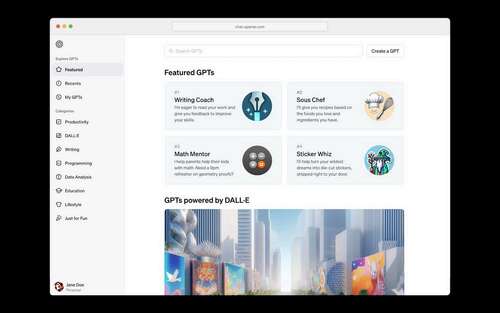GPT-4 Turbo, which is in preview for developers, can call on information as recent as April 2023. And, OpenAI revealed a new way for developers to build AI tools.
At the keynote presentation at OpenAI’s first DevDay conference, held November 6, 2023, in San Francisco, OpenAI announced a new, more powerful version of GPT-4, specialized generative AI tools called GPTs and an Assistants API to help developers build AI apps. Additionally, OpenAI announced that ChatGPT with GPT4 Turbo will be able to draw from current events information as recent as April 2023.
Jump to:
GPT-4 Turbo can digest more information than GPT-4 at a lower price
GPT-4 Turbo adds these new capabilities to GPT-4:
- 128,000 token context length, or 300 pages of a standard book.
- More control for developers, including a JSON mode, the ability to call multiple functions at once, log probabilities and reproducible outputs.
- World knowledge up to April 2023.
- Higher rate limits.
GPT-4 Turbo will cost one cent per 1,000 input tokens and three cents per 1,000 output tokens, cheaper than GPT-4, said OpenAI’s CEO Sam Altman (Figure A).
Figure A

“We decided to prioritize cost first because we need to do one or another, but we’re working on speed next,” Altman said during the keynote presentation.
GPT-4 Turbo is available today in preview for developers with an OpenAI subscription. OpenAI expects GPT-4 Turbo to be production ready in the next few weeks.
ChatGPT will use GPT-4 Turbo in a gradual rollout starting today. At the time of this writing, GP-3.5 showed a knowledge update, too, up to January 2022.
SEE: OpenAI was among the organizations which signed a voluntary list of AI safety assurances with the U.S. government in September. (TechRepublic)
Another change ChatGPT users will see today is the model picker is no longer a drop-down menu; instead, ChatGPT automatically chooses which model and modality, including images from DALL-E 3 and text-to-speech to use depending on the user’s request.
Developers will be able to create and sell custom AI tools known as GPTs
As well as mentioning OpenAI’s stated goal of AGI (hypothetical artificial general intelligence, or AI, which are smarter than humans), Altman emphasized that the goal for the company’s future is to enable AI agents customized to combine specific skills. Toward that end, OpenAI is releasing GPTs, which are tailored versions of ChatGPT (Figure B).
Figure B

GPTs can be designed, customized and sold on a marketplace called GPT Store, which will open later this month (Figure C).
Figure C

Creators can earn revenue from their GPTs based on the GPT’s popularity. Canva and Zapier received early access to the GPT builder and have released their own GPTs.
In ChatGPT Enterprise, users will be able to make GPTs that are sharable only within their organization. GPTs will be available in ChatGPT Enterprise on Wednesday, November 8. OpenAI emphasized that conversations on ChatGPT Enterprise are not used for model training.
Generative design AI will automate 60% of the design effort for new websites and mobile apps by 2026, Gartner predicted in its 2023 Market Databook.
The Assistants API is now available in beta
OpenAI also announced the Assistants API, a tool for building generative AI-based apps that brings together capabilities such as OpenAI’s Code Interpreter, Retrieval and function calling. The Assistants API is built on the same foundation as GPTs, with additional tools. With the Assistants API, developers can add generative AI into their existing apps and services.
For example, OpenAI Code Interpreter can write and generate code and create files. At the keynote, OpenAI demonstrated a voice-based assistant that made changes to users’ OpenAI accounts live.
Assistants API is in beta today; pricing details are available on OpenAI’s site. OpenAI API access is available internationally.
Data and files used with the OpenAI API are not used to train AI models, OpenAI said.
Altman said he sees this Assistants API as a precursor to AI agents, which he believes will gradually be able to take action on their own as they become more capable.
Note: TechRepublic viewed OpenAI’s DevDay keynote virtually.

